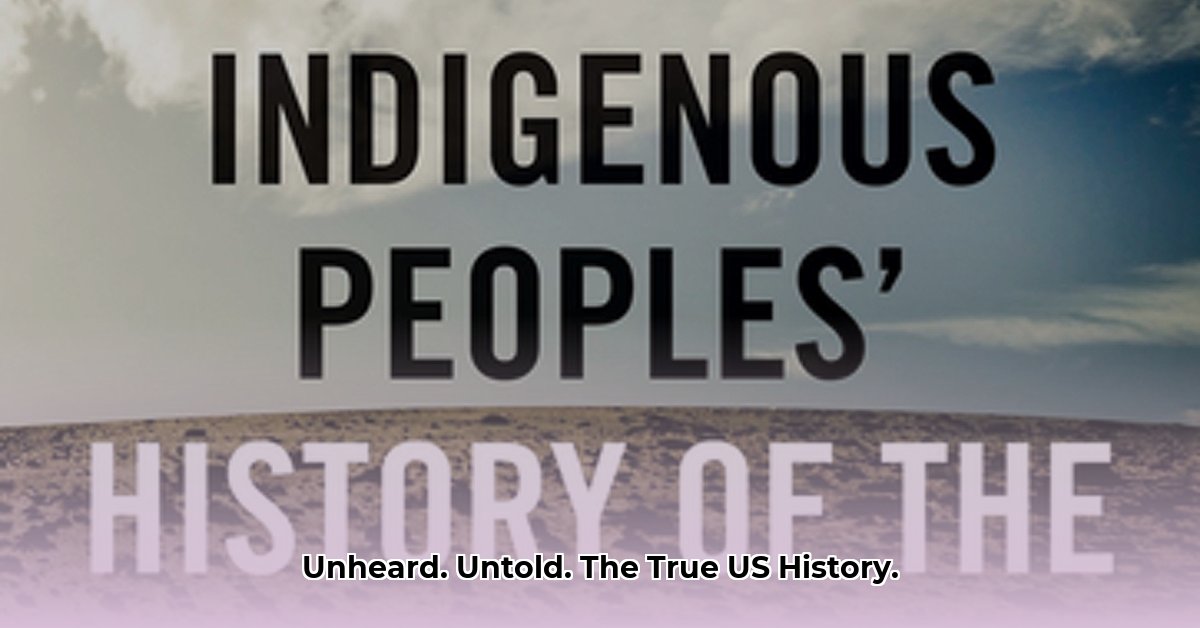This article delves into Roxanne Dunbar-Ortiz’s groundbreaking work, An Indigenous Peoples’ History of the United States, exploring the often-untold story of this land from the perspective of its original inhabitants. We’ll examine key historical periods, themes of settler colonialism and resistance, and the ongoing struggle for Indigenous rights. This journey through the past illuminates the present and offers pathways toward a more just and equitable future.
A Foundational History
The history of the United States begins long before European arrival, a story of diverse Indigenous peoples with unique cultures, languages, and complex societies. Understanding this pre-Columbian world is crucial for grasping the full scope of American history.
Settler Colonialism: The Root of Injustice
Settler colonialism, the driving force behind the dispossession of Indigenous peoples, wasn’t a one-time event but an ongoing process. It involved not just land acquisition, but the systematic dismantling of Indigenous cultures and self-governance. This framework helps us understand historical injustices and their lasting ramifications.
Erasure and Cultural Genocide: Silencing the Past
The deliberate suppression of Indigenous history, languages, and traditions, particularly through the boarding school system, represents a tragic chapter of cultural genocide. Confronting this painful legacy is essential for acknowledging historical trauma and supporting Indigenous healing.
Indigenous Resistance: A Legacy of Strength
Indigenous resistance has been a constant force throughout history. From the Pueblo Revolt to Standing Rock, Indigenous peoples have persistently fought to protect their lands, cultures, and sovereignty. Understanding this legacy of resilience offers powerful lessons for contemporary struggles for justice.
Unmasking Historical Myths
Beyond the familiar narratives, a deeper examination reveals a more complex and challenging history.
Pre-Columbian America: Busting the “Empty Continent” Myth
The Americas were far from an empty wilderness before European contact. They were home to thriving civilizations with advanced agricultural practices, complex social structures, and rich cultural traditions. Recognizing this vibrancy challenges the myth of an uninhabited land ripe for the taking.
Settler Colonialism: An Ongoing System
Settler colonialism is not just a historical event but a persistent system that continues to shape the relationship between Indigenous peoples and the US government. Understanding this ongoing system is essential for addressing present-day inequities.
Reclaiming Narratives: Unearthing Hidden Truths
For too long, Indigenous voices have been marginalized in the telling of American history. Reclaiming these narratives involves challenging dominant perspectives, seeking out Indigenous sources, and amplifying silenced voices.
Indigenous Resistance: Past and Present
Indigenous resistance is not a relic of the past but a continuous thread connecting historical struggles with contemporary movements for self-determination and environmental protection. This ongoing resistance underscores the enduring fight for Indigenous rights.
The Wounds of Assimilation: Boarding Schools and Their Legacy
The trauma inflicted by Indian boarding schools, designed to assimilate Indigenous children by stripping them of their culture and language, continues to resonate through generations. Acknowledging this painful legacy is crucial for healing and reconciliation.
Contemporary Echoes of Injustice: The Past in the Present
The injustices of the past are not confined to history books; they manifest in present-day disparities faced by many Indigenous communities, including limited access to healthcare, education, and economic opportunities.
The Dawes Act and Blood Quantum: Tools of Dispossession
The Dawes Act, which fragmented tribal lands, and the concept of blood quantum, used to determine tribal enrollment, are colonial constructs that have undermined tribal sovereignty and cultural continuity.
Relocation and Termination: Mid-20th Century Disruptions
Relocation and termination policies of the mid-20th century further disrupted Indigenous communities, highlighting the ongoing efforts to dismantle tribal structures and assimilate Indigenous peoples.
Why This History Matters
Understanding Indigenous history is not just about filling in gaps; it’s about transforming our understanding of America.
The Full Picture: Beyond Limited Perspectives
Incorporating Indigenous experiences enriches our understanding of American history, providing a more nuanced and complete perspective on the forces that have shaped the nation.
Recognizing Contributions: A Rich Legacy
Acknowledging the vast contributions of Indigenous peoples, from agriculture and medicine to art and political systems, allows us to fully appreciate their lasting impact on American society.
Facing Difficult Truths: A Path to Healing
Confronting the painful chapters of American history, including forced removals and broken treaties, is necessary for understanding the lasting impact of colonization and working toward healing and reconciliation.
Beyond Stereotypes: Embracing Diversity
Learning about Indigenous history challenges stereotypes and promotes respect for the rich diversity of Indigenous cultures, languages, and traditions.
Learning from the Past: Building a Sustainable Future
Traditional Indigenous knowledge offers valuable lessons about sustainable living and environmental stewardship, providing crucial insights for addressing contemporary challenges.
How This Changes Our View of America
Centering Indigenous experiences transforms our understanding of the American narrative. It exposes the realities of settler colonialism, challenges dominant historical narratives, and highlights the ongoing struggle for Indigenous rights. This shift in perspective empowers us to engage with the past critically and work toward a more just future.
Key Events and Figures
| Period | Key Events | Key Figures |
|---|---|---|
| First Contact & Colonialism | The Great Dying (1616-1619), King Philip’s War (1675-1676), Pueblo Revolt (1680) | |
| Westward Expansion | Pontiac’s Rebellion (1763), Battle of Little Bighorn (1876) | Tecumseh, Sitting Bull |
| Forced Removal & Assimilation | Trail of Tears (1830s), Carlisle Indian Industrial School (1879-1918), Wounded Knee (1890) | Chief Joseph |
| 20th Century Activism | Occupation of Alcatraz (1969), American Indian Movement (AIM) (Founded late 1960s) | American Indian Movement Activists |
This table offers a starting point for exploring the rich and complex history of Indigenous peoples in the United States. Further research and engagement with Indigenous voices are essential for a deeper understanding.
A Call to Action
Learning about Indigenous history is an ongoing process. Explore further resources, support Indigenous-led organizations, and engage in meaningful allyship to contribute to a more just and equitable future.
Further Resources
- Books: An Indigenous Peoples’ History of the United States by Roxanne Dunbar-Ortiz, As Long as Grass Grows by Dina Gilio-Whitaker, Our History Is the Future by Nick Estes
- Organizations: National Congress of American Indians, Native American Rights Fund
This article aims to provide a comprehensive overview of Indigenous history in the United States, but ongoing research continually adds new insights. Different historians may offer varying interpretations, and some historical details remain subject to scholarly debate. This dynamic nature of historical understanding encourages us to remain open to new information and diverse perspectives.
- Borosilicate Glass Storage Containers Handle Extreme Temperatures Safely - January 23, 2026
- Borosilicate Glass Food Storage Containers Bring Durable Safety To Your Kitchen - January 22, 2026
- Microwave Safe Glass Containers for Durable Everyday Food Prep - January 21, 2026










